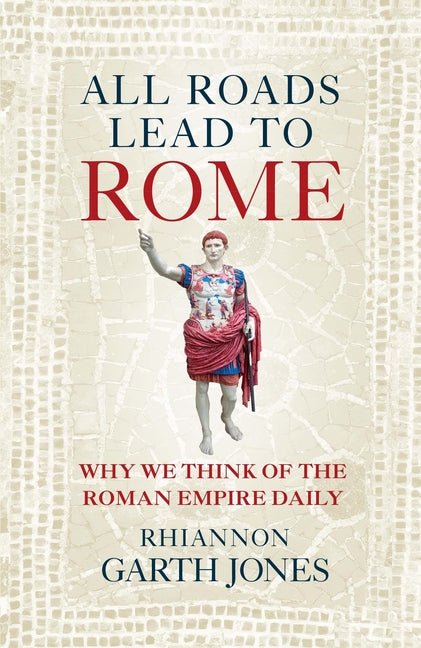Aurum
All Roads Lead to Rome: Why We Think of the Roman Empire Daily
Couldn't load pickup availability
Rhiannon Garth-Jones explores Rome's enduring legacy through three core themes: religion, empire, and culture. Each chapter examines how Rome's history, governance, and mythology have been reimagined throughout centuries, and how these interpretations continue to shape our modern world.
Rome is not merely a city--it's an enduring idea, a symbol of identity, power, and legitimacy that has shaped the course of history for over 1,500 years. This book embarks on an exploration of how the concept of Rome has been invoked by emperors, modern governments, religious leaders, and even pop culture icons, all using it to assert authority and influence society. Each chapter explores how Rome's history, governance, and mythology have been reimagined throughout centuries, and how these interpretations continue to shape our modern world. By delving into Rome's influence, readers gain a deeper understanding of the forces shaping today's global landscape.
For readers of all things Roman, e.g. Emperors of Rome by Mary Beard, Rubicon, Dynasty and Pax by Tom Holland as well as The West: A New History of Old Idea by Naoise MacSweeney and The Map of Knowledge by Violet Moller.
Share
Book Details
ISBN:
9781836002956
EAN:
9781836002956
Binding:
Hardcover
Pages:
304
Authors:
Rhiannon Garth Jones
Publisher:
Aurum

Surprisingly fun and easy to read, even if you’re not a massive history buff. It mixes facts with modern-day reflections in a way that actually makes sense of why the Roman Empire still pops up in everyday thinking—from architecture to politics to the odd internet meme. The tone’s light but not silly, and there’s a good balance of historical insight without going full-on textbook. It’s the kind of book you can read in bits without losing track, and you’ll probably find yourself saying, “Huh, I didn’t know that” more than once. Entertaining, informative, and a nice change from the usual history reads.
I picked this up as I don't know much about the Roman empire & found it very interesting. It's a bit different to other history books I've read as it's more about the long term global influence rather than the Romans as a subject matter, though I still learned a lot about that. I like that it comes at it from different angles, too, as in high school all we really learn is that they came over this way, and left behind a load of technology, built a wall to keep the Scotts out, then evaporated. Interesting to learn about the influence further East and it's not a super dense, difficult read. Obviously it can't be incredibly in depth in any one area as it is a huge subject but I think it does a really good job, as someone who has no idea what I'm talking about.
The book reads as though, having done the research, the author couldn't be bothered to correlate it, making it hard work for the informed reader, and frequently unfathomable for the uninformed one. The tendency to jump backwards and forwards in time is particularly disconcerting, as is the lack of well-known reference points. The treatment of certain individuals is also decidedly odd, as are decisions about the significance of some individuals and events. I have read Gibbon. who knew both how to correlate and to write, and a number of original sources - if I hadn't I might have given up on this. As it is, I found few revelations and many longueurs. Rather unenlightening.
Honestly it was a struggle to get through it, being as it is full of the miserable and derisive anti-western narrative that seems to infect academia these days. Willfully glosses over the atrocities of the Otoman Empire in order to engage in navel gazing about the whiteness of Roman statuary and calling out the British empire and modern America; while Russia is treated with kid gloves and at points in the book you do get the impression that the author is giving tacit approval of Russia's military campaigns.It's disappointing that what could have been a book about the influences of the Roman empire on today's world has been turned into basically this author's tiresome and overdone anti-western rhetoric.Oh, and Mark Anthony & Cleopatra did not die at Actium, either. That's a pretty glaring factual error on the author's part.
I'm a historian, so I always read books like this with a critical eye. The idea to hone in on the TikTok trend about how often men think about the Roman Empire is an interesting methodology. The book is entertaining and informative, expanding on quite obscure elements of the Roman Empire. As a women's historian, I would have liked to see more information about women's role in Ancient Rome and the oppression prevalent throughout the empire. Without this, I feel the book does a disservice to readers by presenting Ancient Rome as a kind of utopia- especially as it was inspired by men's frequent thoughts on the empire and written by a female author.However, the writer has done a very good job of exploring memory culture and the enduring influence of Rome on our lives.


